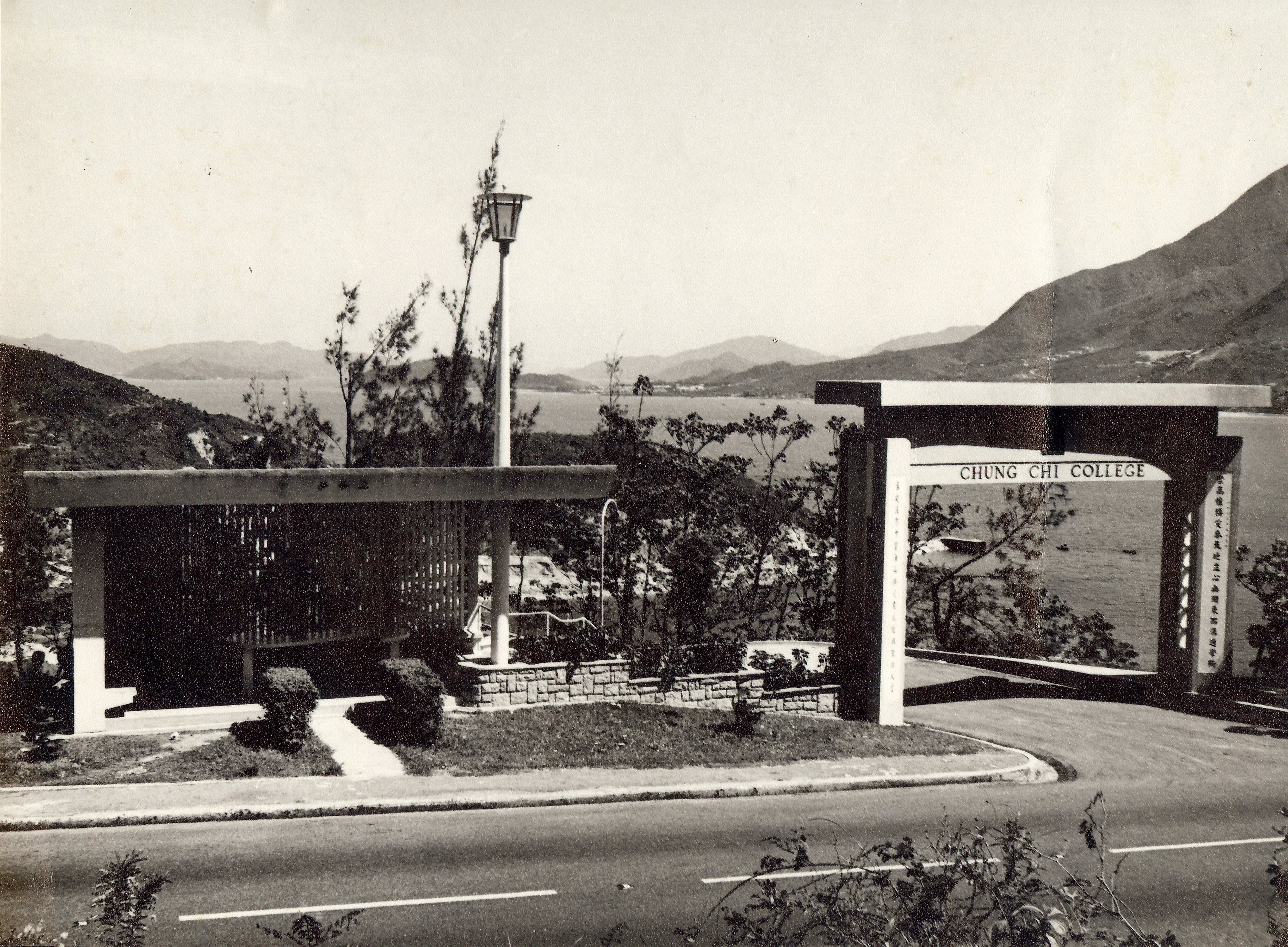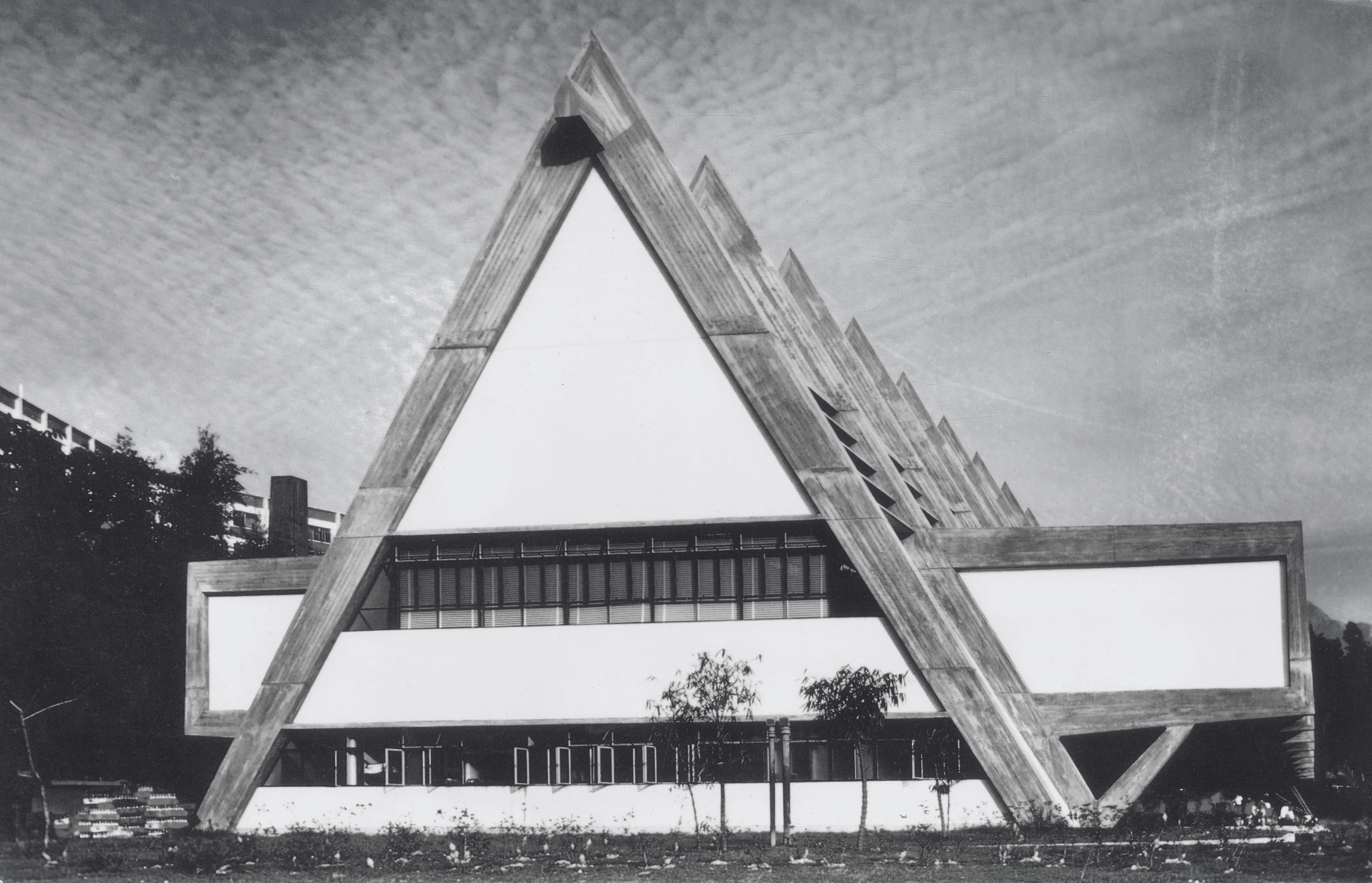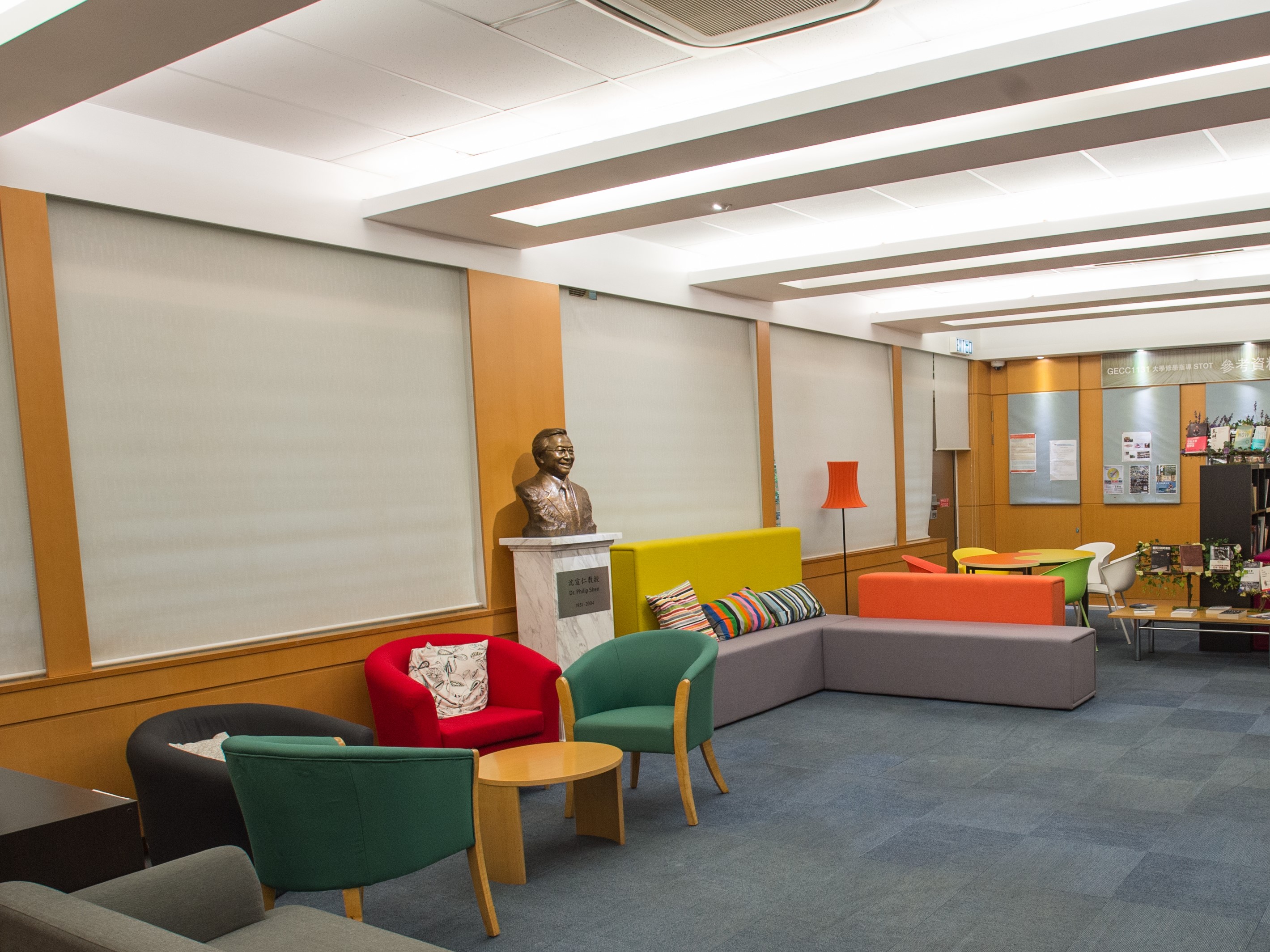Chung Chi College was founded in October 1951 by the representatives of Protestant Churches in Hong Kong. The College inherited a long and rich tradition of the former thirteen Christian colleges and universities in mainland China. It seeks to promote Christian faith, learning and research. Three of the Founders were Dr. Lee Ying Lin, Bishop Ronald Owen Hall, and Mr. Au Wai Kwok David.

The College had a very modest beginning with only 63 students in the first year. It used borrowed and rented premises, first in the Old Hall of St. John’s Cathedral and St. Paul’s Co-educational College on Hong Kong Island, and later on at No. 147 Caine Road and in the Bishop Hoare Memorial Building on Lower Albert Road.

The Emblem was derived from the cross, lotus, and clouds depicted on the Xi'an Stele during the Tang Dynasty, signifying that Chung Chi College as a Christian institution upholds the mission of Christianity deeply rooted in China over a thousand years ago.

The College moved to its permanent site in the New Territories, in the beautiful Ma Liu Shui Valley. Government assisted this move with a grant of 10 acres of land and the building of a railway station, now known as University Station.
The first girls’ and boys’ dormitories were completed respectively. The girls’ dormitory was originally referred to as “Women’s Hostel”, and was then named “Hua Lien Tang”, in memory of Dr. Edwin E. Walline, the Treasurer of the first College Board. The boys’ dormitory was originally referred to as “Men’s Hostel”, and was then named “Ying Lin Tang”, in memory of Dr. Lee Ying Lin, the College’s first President of the College.

The Chinese couplet inscribed on the stone pillars of the Gate was written by the then College President Dr. D. Y. Lin, the translation of which reads as follows:
The highest principle in relationships is Universal Love; Heaven and Earth have ordained that the world is neither of the East, nor of the West, but to be united into a loving whole with Learning and Culture.
The firmest foundation is the cultivation of scholarship, to be obtained here amidst the scenic hills and seashores where the Society of Man is molded and refined into a Living Community.

The foundation stone laying ceremony of the College Chapel was held during the 10th Anniversary of Chung Chi. In the following year, the Chapel was completed. Emblems of the former thirteen Christian universities in China were engraved on the chancel walls.
The Chinese University of Hong Kong (CUHK) was established, and Chung Chi College was incorporated as one of the three foundation colleges of the university.
The stadium was named at the suggestion of the donor Mr. Chan Tak Tai Edward, a graduate of the Lingnan University in Guangzhou, who wanted to honour his father’s appreciation for the Lingnan educational spirit.

The Programme of Integrative Basic Studies (IBS) incorporated the Philosophy of Life programme of the past. It emphasized those Christian ideals of higher education that were the concern of the founders of the College. The purpose of the programme was primarily to meet the need of students for a wider perspective than their major and minor subjects provided.
Located at the corner of the campus, the theology building includes the functions of teaching and living all in one. Since its completion, the Chung Chi Theology Division has been housed in this building. In 2004, it was renamed the Divinity School of Chung Chi College and is at present a theological education institution located at a public university in Chinese society.

Donated by the Henry Luce Foundation, the new library was named Elisabeth Luce Moore Library. To transfer the books from the old library to their new home a few hundred meters away, staff and students worked together in human chains, passing the books by hand to identical shelving in the new building. This experience was evidently very meaningful for the campus community.

The building was designed by the renowned architect Mr. Dennis Lau. It was named Chung Chi Tang (眾志堂). “眾志” rhymes with “Chung Chi” and means “together we can do great things”.

The report of the Second Fulton Commission completed. The Report emphasized academic participation in the governance of the University and the integration of academic departments. College departments were integrated into departments under the governance of the central administration, responsible for “subject-orientated” teaching; the Colleges were responsible for “student-orientated” teaching, with General Education continued to be entrusted to the Colleges.

The endowment established through this project has provided resources for the College to develop and, thus, to strive for its mission and vision.

The university introduced a flexible credit unit system, permitting students to complete the required number of units and graduate in three years. The College has been dedicated to developing a variety of non-formal education activities, including Language Enhancement Programme, Student Visiting Programme, Mentor Programme, etc.

The renovated “Lotus Pond” was officially named Lake Ad Excellentiam, echoing with Chung Chi's motto, "In Pursuit of Excellence"

The opening of the redeveloped Administration building was held in 2002. It is equipped with a multi-functional Alumni Room and a Lobby Gallery where art exhibitions can be held.

The building was named after Dr. Chi-tung Yung, the College’s longest-tenured President and the founding President of the Divinity School.

The Basic Studies Resources Centre in Elizabeth Luce Moore Library was upgraded and renamed as the Shen's General Education Resource Centre, in honour of Dr. Philip Shen’s contributions to the College’s General Education Programme.

In 2021, the College celebrated its 70th Anniversary. Upholding the College motto “In Pursuit of Excellence”, Chung Chi will carry on the past and open a way the future, nurturing talents with insightful knowledge, a liberal attitude, and global visions.
The complex consists of a pair of twin buildings, the Kunkle Student Centre (Low Block) and the Leung Fung Yee Building (High Block). Facilities include Fook Wo and Laura Jee Li Theatre, Hop Wai Garden, Student Association Rooms, activity rooms, leisure corners, music rooms, student wellness space, etc.
Chung Chi College was founded in October 1951 by the representatives of Protestant Churches in Hong Kong. The College inherited a long and rich tradition of the former thirteen Christian colleges and universities in mainland China. It seeks to promote Christian faith, learning and research. Three of the Founders were Dr. Lee Ying Lin, Bishop Ronald Owen Hall, and Mr. Au Wai Kwok David.
The College had a very modest beginning with only 63 students in the first year. It used borrowed and rented premises, first in the Old Hall of St. John’s Cathedral and St. Paul’s Co-educational College on Hong Kong Island, and later on at No. 147 Caine Road and in the Bishop Hoare Memorial Building on Lower Albert Road.
The Emblem was derived from the cross, lotus, and clouds depicted on the Xi'an Stele during the Tang Dynasty, signifying that Chung Chi College as a Christian institution upholds the mission of Christianity deeply rooted in China over a thousand years ago.
The College moved to its permanent site in the New Territories, in the beautiful Ma Liu Shui Valley. Government assisted this move with a grant of 10 acres of land and the building of a railway station, now known as University Station.
The first girls’ and boys’ dormitories were completed respectively. The girls’ dormitory was originally referred to as “Women’s Hostel”, and was then named “Hua Lien Tang”, in memory of Dr. Edwin E. Walline, the Treasurer of the first College Board. The boys’ dormitory was originally referred to as “Men’s Hostel”, and was then named “Ying Lin Tang”, in memory of Dr. Lee Ying Lin, the College’s first President of the College.
The Chinese couplet inscribed on the stone pillars of the Gate was written by the then College President Dr. D. Y. Lin, the translation of which reads as follows:
The highest principle in relationships is Universal Love; Heaven and Earth have ordained that the world is neither of the East, nor of the West, but to be united into a loving whole with Learning and Culture.
The firmest foundation is the cultivation of scholarship, to be obtained here amidst the scenic hills and seashores where the Society of Man is molded and refined into a Living Community.
The foundation stone laying ceremony of the College Chapel was held during the 10th Anniversary of Chung Chi. In the following year, the Chapel was completed. Emblems of the former thirteen Christian universities in China were engraved on the chancel walls.
The Chinese University of Hong Kong (CUHK) was established, and Chung Chi College was incorporated as one of the three foundation colleges of the university.
The stadium was named at the suggestion of the donor Mr. Chan Tak Tai Edward, a graduate of the Lingnan University in Guangzhou, who wanted to honour his father’s appreciation for the Lingnan educational spirit.
The Programme of Integrative Basic Studies (IBS) incorporated the Philosophy of Life programme of the past. It emphasized those Christian ideals of higher education that were the concern of the founders of the College. The purpose of the programme was primarily to meet the need of students for a wider perspective than their major and minor subjects provided.
Located at the corner of the campus, the theology building includes the functions of teaching and living all in one. Since its completion, the Chung Chi Theology Division has been housed in this building. In 2004, it was renamed the Divinity School of Chung Chi College and is at present a theological education institution located at a public university in Chinese society.
Donated by the Henry Luce Foundation, the new library was named Elisabeth Luce Moore Library. To transfer the books from the old library to their new home a few hundred meters away, staff and students worked together in human chains, passing the books by hand to identical shelving in the new building. This experience was evidently very meaningful for the campus community.
The building was designed by the renowned architect Mr. Dennis Lau. It was named Chung Chi Tang (眾志堂). “眾志” rhymes with “Chung Chi” and means “together we can do great things”.
The report of the Second Fulton Commission completed. The Report emphasized academic participation in the governance of the University and the integration of academic departments. College departments were integrated into departments under the governance of the central administration, responsible for “subject-orientated” teaching; the Colleges were responsible for “student-orientated” teaching, with General Education continued to be entrusted to the Colleges.
The endowment established through this project has provided resources for the College to develop and, thus, to strive for its mission and vision.
The university introduced a flexible credit unit system, permitting students to complete the required number of units and graduate in three years. The College has been dedicated to developing a variety of non-formal education activities, including Language Enhancement Programme, Student Visiting Programme, Mentor Programme, etc.
The renovated “Lotus Pond” was officially named Lake Ad Excellentiam, echoing with Chung Chi's motto, "In Pursuit of Excellence"
The opening of the redeveloped Administration building was held in 2002. It is equipped with a multi-functional Alumni Room and a Lobby Gallery where art exhibitions can be held.
The building was named after Dr. Chi-tung Yung, the College’s longest-tenured President and the founding President of the Divinity School.
Following the 3-3-4 Scheme implemented in 2012, the University reverted to a four-year curriculum. New colleges had been established and by that time there were nine colleges in total. For over half a century of development, Chung Chi has strived to offer students with quality education yet the time has come for the College to review its campus, facilities, and student activity spaces.
The Basic Studies Resources Centre in Elizabeth Luce Moore Library was upgraded and renamed as the Shen's General Education Resource Centre, in honour of Dr. Philip Shen’s contributions to the College’s General Education Programme.
In 2021, the College celebrated its 70th Anniversary. Upholding the College motto “In Pursuit of Excellence”, Chung Chi will carry on the past and open a way the future, nurturing talents with insightful knowledge, a liberal attitude, and global visions.
The complex consists of a pair of twin buildings, the Kunkle Student Centre (Low Block) and the Leung Fung Yee Building (High Block). Facilities include Fook Wo and Laura Jee Li Theatre, Hop Wai Garden, Student Association Rooms, activity rooms, leisure corners, music rooms, student wellness space, etc.